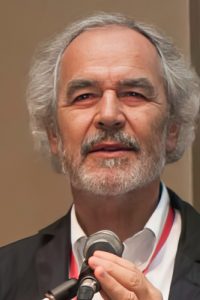Welcome

Bernd J. Krämer is Professor Emeritus of FernUniversität in Hagen. He has been Chairman of ServTech since 2007 and Honorary Chairman of edu-sharing.net since 2021 after serving on the board since 2009. He was a co-founder of these two non-profit research associations. He has been a guest professor at several renowned universities, including Shanghai Jiao Tong University, the International Computer Science Institute affiliated with UC Berkeley, Monash University in Melbourne, and the Queensland University of Technology in Brisbane.
Biography
Krämer has had a lifelong interest in software engineering. He has pioneered a modelling approach for concurrent and distributed software systems that combines high-level Petri nets and algebraic specifications of abstract data types. With the advent of the World Wide Web in the early 1990s, he also focused on software development for educational applications. A more recent contribution is a networked repository, edu–sharing, which supports the sharing, reuse, and adaptation of digital learning resources, including educational content, codified know-how and pedagogical methods, and learning tools. More recently, he has applied his modelling skills to enable flexible manufacturing networks and improve healthcare processes. He has published his research results in academic journal articles, books, book chapters, refereed conference proceedings, and expert reports.
Krämer studied electrical engineering and computer science and received his computer science diploma and his engineering doctorate from Technische Universität Berlin. Several of his students and collaborators have gone on to become leading figures in industry and academia.
Professional Activities
Bernd Krämer is active in several non-profit associations and scientific communities, including edu-sharing.net (honorary chairman); ServTech, the Scientific Academy for Service Technology (Chairman); the Steering Committee of the International Conference on Service-Oriented Computing, ICSOC, the International Conference on Service Oriented Computing (from 2007-2023); and the Society for Design & Process Science (SDPS, Past President, Board Member). He was a member of the Intelligent Education Networks project group of the Digital Summit, the key instrument for implementing the federal government’s Digital Agenda. His very first EU-funded project was GRASPIN (Personal Workstation for Incremental Graphical Specification and Formal Implementation of Non-Sequential Systems, FP1, 1984-1989, budget: 15 Mio ECU). GRASPIN was one of the first EU projects in software technology to address formal specification and systematic programme development. More recently, he has been project manager in ServTech’s FP7 project IMAGINE (Innovative End-to-end Management of Dynamic Manufacturing Networks) and the HORIZON 2020 projects ICP4Life (An Integrated Collaborative Platform for Managing the Product-Service Lifecycle), Qualitop (Monitoring multidimensional aspects of QUAlity of Life after cancer ImmunoTherapy – an Open smart digital Platform for personalised prevention and patient management), Oncoscreen (A European “shield” against colorectal cancer based on novel, more precise and affordable risk-based screening methods and viable policy pathways), and NARRATE (regeNerAtive Resilient smaRt mAnufacTuring nEtworks). He was a member of the Editorial Advisory Board of the IARIA Journal on Advances in Life Sciences and a member of the Editorial Board of Springer’s journal Innovations in Systems and Software Engineering until 2021.
As an honorary chairman of edu-sharing.net, he continues to promote Open Educational Resources and the educational resources repository edu-sharing. edu-sharing is the result of one of his later projects, which was developed between 2004 and 2009 as part of the DFG-funded CampusContent project. Since then, the software has been further developed by members of edu-sharing.net. He is a member of the steering committee of the SDPS conference series. He became an SDPS Fellow in 2003 and an IRARIA Fellow in 2011. He received the SDPS Priscilla and Raymond T. Yeh Award in 2006.
Until May 2013, he was a member of the Supervisory Board of FernUniversität in Hagen.



